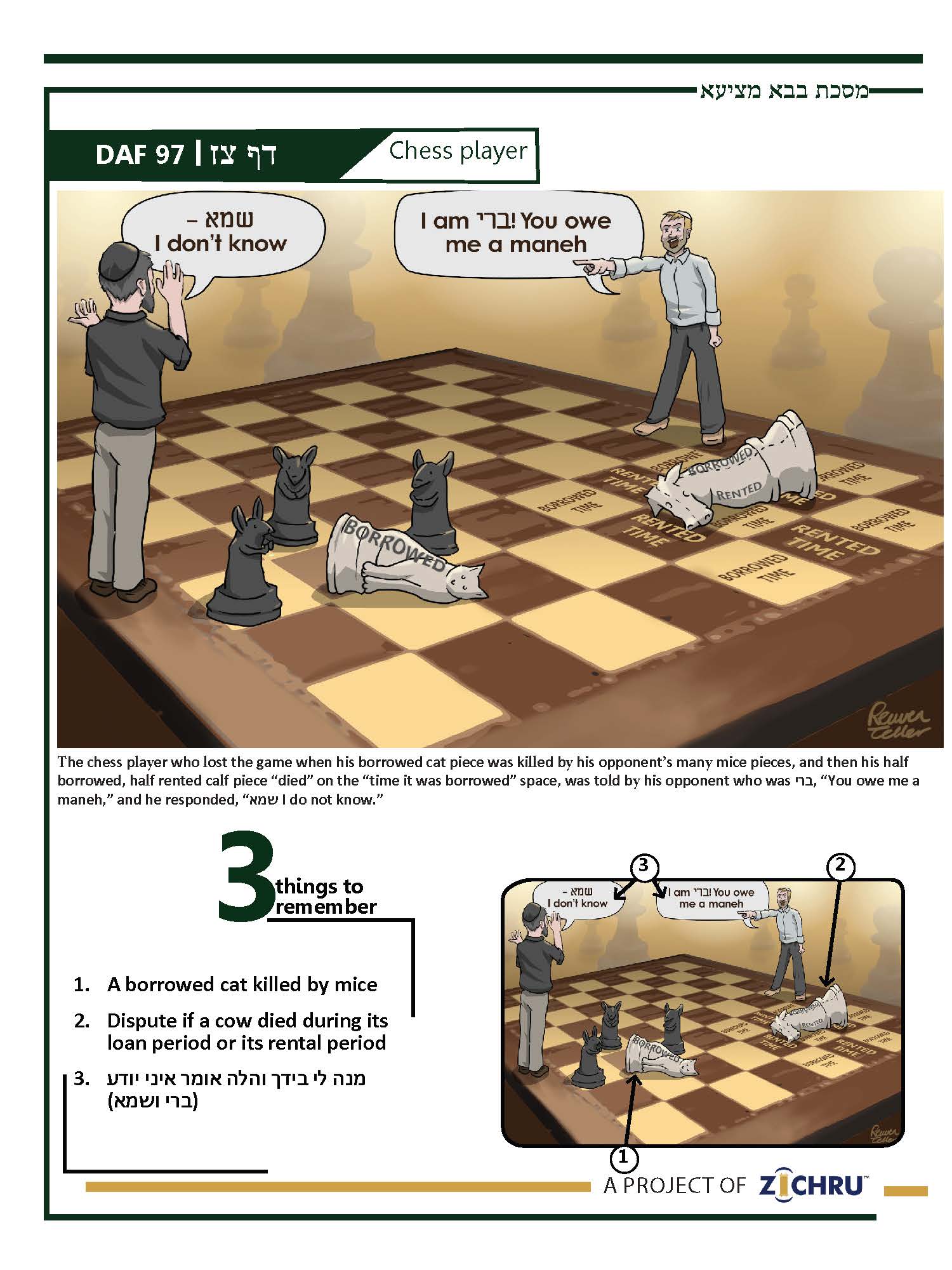Bava Metzia - Daf 97
- Audio Timestamps
0:00 - The 3 Sugyos
3:02 - Review of 3 Sugyos
5:49 - Siman
8:23 - 4 Blatt Back Chazarah
16:09 - Pop Quiz (Last 7 blatt)
- For access to all Zichru resources including PDFs, and illustrations CLICK HERE
- A borrowed cat which died while killing mice
A man once borrowed a cat to eliminate mice. However, the mice banded together and killed the cat. Rav Ashi asked: כי מתה מחמת מלאכה דמי או לא – is it like an animal which died because of its work, or not? Tosafos explains that perhaps he should not have placed the cat among such a large group of mice. Rav Mordechai responded, quoting Rava: גברא דנשי קטלוהו – a man whom women grouped together and killed, לא דינא ולא דיינא – there is no judgement and no judge, i.e., it is completely unexpected. Here too, the borrower did not need to anticipate the possibility of the mice killing the cat and qualifies for the מתה מחמת מלאכה exemption. In another version, the cat ate many mice, and became overheated and died. Rav Ashi wondered if the borrower is exempt in this case because of מתה מחמת מלאכה, and Rav Mordechai responded with the above quote, which in this version refers to a man who had relations with many women and died from it. Here, too, the borrower did not expect the cat would eat so many mice as to endanger itself and is exempt from paying.
- Dispute if a cow died during its loan period or its rental period
The next Mishnah discusses one who borrowed a cow for half of the day and rented it for the other half, or borrowed it for one day and rented it for the next day, or rented one cow and borrowed another, and the cow died. The owner says, in the respective cases: שאולה מתה – “The borrowed [cow] died” (in the final case), ביום שהיתה שאולה מתה – or, “it died on the day it was borrowed” (in the middle case), בשעה שהיתה שאולה מתה – or, “it died while it was borrowed” (in the first case), claiming the borrower/renter should be liable, and he responds "איני יודע" – I do not know, he is liable to pay. In the reverse case, where the borrower/renter claims the cow was rented when it died (or, in the final case, the rented cow was the one which died), and the owner says he does not know, the borrower/renter is exempt. If each party makes their claim with certainty, the borrower/renter swears that the rented cow dies and is exempt. If both parties say they do not know, they divide the disputed cow’s value (this is attributed on Daf 98b to the opinion of Sumchos).
- מנה לי בידך והלה אומר איני יודע (ברי ושמא)
The Mishnah’s first ruling requires the defendant to pay when the owner claims the cow died while borrowed, and the defendant says he does not know. This apparently proves that if one says to another: מנה לי בידך – “You owe me a maneh,” והלה אומר איני יודע – and the other says, “I do not know,” חייב – he is liable to pay. This case is a machlokes Amoraim, where Rav Huna and Rav Yehudah say the defendant is liable, since the claimant is certain (ברי) and the defendant is uncertain (שמא), and Rav Nachman and Rebbe Yochanan say he is exempt, because the uncertain defense is not sufficient proof to require payment. Our Mishnah proves that he does pay!? The Gemara answers: כגון שיש עסק שבועה ביניהן – the Mishnah is a case where there is a dispute between them involving a shevuah. The next Daf will explain that the Mishnah’s case is where the defendant is מודה במקצת – admitting to part of the claim and must swear to deny the rest. Since he does not know, we rule: מתוך שאינו יכול לישבע משלם – since he cannot swear, he must pay the remainder of the claim.
Siman – Chess player
The chess player who lost the game when his borrowed cat piece was killed by his opponent’s many mice pieces, and then his half borrowed, half rented calf piece “died” on the “time it was borrowed” space, was told by his opponent who was ברי, “You owe me a maneh,” and he responded, “שמא I do not know.”


